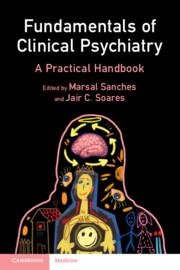Book contents
- Fundamentals of Clinical Psychiatry
- Reviews
- Fundamentals of Clinical Psychiatry
- Copyright page
- Contents
- Contributors
- Foreword
- Preface
- Chapter 1 Introduction
- Chapter 2 The Psychiatric Interview
- Chapter 3 Psychopathology and the Mental Status Examination
- Chapter 4 Classifications and the Diagnostic Process in Psychiatry
- Chapter 5 Neurobiology of Mental Disorders
- Chapter 6 Psychosocial Theories and Their Implications for Psychiatry
- Chapter 7 General Aspects of Psychopharmacology
- Chapter 8 Neurostimulation Treatments
- Chapter 9 Ethico-legal Considerations in Psychiatry
- Chapter 10 Transcultural Aspects of Mental Health Care
- Chapter 11 Child and Adolescent Psychiatry
- Chapter 12 Principles of Geriatric Psychiatry
- Chapter 13 Reproductive Psychiatry
- Chapter 14 Psychomotor Agitation
- Chapter 15 The Suicidal Patient
- Chapter 16 Depressive Disorders
- Chapter 17 Bipolar Disorders
- Chapter 18 Psychotic Disorders
- Chapter 19 Anxiety Disorders
- Chapter 20 Obsessive-Compulsive Disorder
- Chapter 21 Posttraumatic Stress Disorder
- Chapter 22 Borderline Personality Disorder
- Chapter 23 Antisocial Personality Disorder
- Chapter 24 Other Personality Disorders
- Chapter 25 Eating Disorders
- Chapter 26 Alcohol Use Disorder
- Chapter 27 Other Substance Use Disorders
- Chapter 28 Autistic Spectrum Disorders
- Chapter 29 Attention Deficit/Hyperactivity Disorder
- Chapter 30 Delirium and Other Medical Conditions Presenting with Psychiatric Symptoms
- Chapter 31 Dementia
- Chapter 32 Psychiatric Care of the Medical Patient
- Appendix
- Index
- References
Chapter 8 - Neurostimulation Treatments
Published online by Cambridge University Press: 02 January 2025
- Fundamentals of Clinical Psychiatry
- Reviews
- Fundamentals of Clinical Psychiatry
- Copyright page
- Contents
- Contributors
- Foreword
- Preface
- Chapter 1 Introduction
- Chapter 2 The Psychiatric Interview
- Chapter 3 Psychopathology and the Mental Status Examination
- Chapter 4 Classifications and the Diagnostic Process in Psychiatry
- Chapter 5 Neurobiology of Mental Disorders
- Chapter 6 Psychosocial Theories and Their Implications for Psychiatry
- Chapter 7 General Aspects of Psychopharmacology
- Chapter 8 Neurostimulation Treatments
- Chapter 9 Ethico-legal Considerations in Psychiatry
- Chapter 10 Transcultural Aspects of Mental Health Care
- Chapter 11 Child and Adolescent Psychiatry
- Chapter 12 Principles of Geriatric Psychiatry
- Chapter 13 Reproductive Psychiatry
- Chapter 14 Psychomotor Agitation
- Chapter 15 The Suicidal Patient
- Chapter 16 Depressive Disorders
- Chapter 17 Bipolar Disorders
- Chapter 18 Psychotic Disorders
- Chapter 19 Anxiety Disorders
- Chapter 20 Obsessive-Compulsive Disorder
- Chapter 21 Posttraumatic Stress Disorder
- Chapter 22 Borderline Personality Disorder
- Chapter 23 Antisocial Personality Disorder
- Chapter 24 Other Personality Disorders
- Chapter 25 Eating Disorders
- Chapter 26 Alcohol Use Disorder
- Chapter 27 Other Substance Use Disorders
- Chapter 28 Autistic Spectrum Disorders
- Chapter 29 Attention Deficit/Hyperactivity Disorder
- Chapter 30 Delirium and Other Medical Conditions Presenting with Psychiatric Symptoms
- Chapter 31 Dementia
- Chapter 32 Psychiatric Care of the Medical Patient
- Appendix
- Index
- References
Summary
Neurostimulation entails changing brain activity by electric, magnetic, or other forms of energy. Electroconvulsive therapy (ECT) has been used for more than eight decades to treat illnesses that are the bread and butter of psychiatry. Novel treatments have emerged while existing ones have undergone modifications. This could lead to fundamental changes as to how the field manages illness. Examples are transcranial magnetic stimulation (TMS), vagus nerve stimulation (VNS), and other techniques. This chapter focuses on ECT while broadly covering other neurostimulation treatments.
Keywords
- Type
- Chapter
- Information
- Fundamentals of Clinical PsychiatryA Practical Handbook, pp. 64 - 70Publisher: Cambridge University PressPrint publication year: 2025

